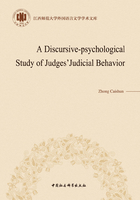
1.3 Theoretical Assumptions of the Study
This research proposes a discursive-psychological approach to JJB,which is premised on our ontological and epistemological commitment to the researched object.Building on the current knowledge about JJB as mentioned in the previous two sections,the present study subscribes to a discursive view of judicial behavior.This orientation is in line with the discursive turn in social sciences and,particularly,in legal studies(Liao,2006).In this vein,it is argued that “the trial system is constructed entirely through linguistic performances of various kinds,both spoken and written”(Luchjenbroers & Aldridge,2008:191).Therefore,discourse shall be a reasonable juncture for JJB research.
Underlying the discursive view of JJB is a constructionist epistemology which takes a dialectic stance to overcome the unproductive division between “macro” and “micro” or between “structure” and “agency” .In other words,it highlights a holistic understanding of judicial behavior and avoids the one-dimensional view of structuralism or subjectivism.
Given this theoretical orientation,judicial behavior research shall adopt a trans-disciplinary way,taking into consideration both the dynamicism of discourse process and the structural constraints from psychological,institutional,social and cultural systems.The discursive nature of JJB suggests that linguistics,and discourse analysis in particular,shall occupy a central place.Meanwhile,judicial behavior as a social phenomenon is necessarily subject to the constraints of social psychology[2].In this light,this study will draw on discursive psychology(DP),an approach which integrates discourse and social psychology.It emerges from distinctive,but converging,lines of investigation in psychology,sociology,anthropology,and linguistics(e.g.Potter & Wetherell,1987,Edwards & Potter 1992;Potter,1996;Edwards 1997;Harre,2001).There are three central tenets,which differentiate DP from the traditional cognitive approach(see Table 1-1):
Table 1-1 Two Psychological Approaches to Judicial Behavior Research

From this comparison,we can find that DP is by nature a grounded theory.Following it,JJB theories shall be extracted through rigorous discourse analysis.However,this form of research shall be better regarded as a complement to more traditional cognitive methods of dealing with the same issue(Bavelas,2005).The validity of the discursive approach will be enhanced if its findings can also endure the experimental tests.
In sum,this study will utilize DP as the lens to examine judges' discursive practices.It aims to show what insights DP can yield into JJB in the judicial process.Thus,it echoes the call for diversity in theoretical approaches to “facilitate progress toward good explanations of judicial behavior”(Baum,1997).We also hope that this study may help to consolidate the role of forensic linguistics in the legal scholarship.